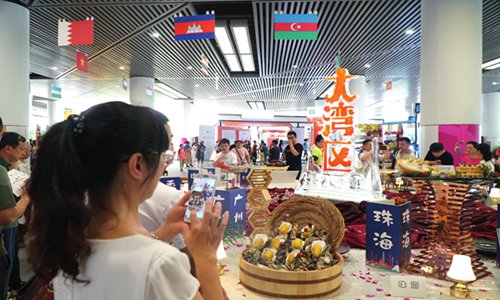Mainland policy to attract HK, Macao, TW talent
Social insurance benefits to be extended to all from 2020

A Guangzhou citizen takes a photo of the Guangdong-Hong Kong-Macao Greater Bay Area cuisine display at the World Cuisine Collection. Photo: Li Jieyi/GT
The planned social insurance policy to be applied to people from Hong Kong, Macao and Taiwan in the Chinese mainland will promote talent flows and increase mutual understanding between mainlanders and the people from the three areas, experts said on Monday.
From 2020, people from Hong Kong, Macao and Taiwan who work, live or study in the Chinese mainland can enjoy the social insurance policies as mainlanders do, China's Ministry of Human Resources and Social Security announced recently.
The ministry said employers should give staff from Hong Kong, Macao and Taiwan social insurance, consisting of pensions, unemployment, medical, work-related injury and maternity, starting from 2020. Unemployed citizens from the three areas can join the urban and rural basic pension and medical insurance; college students from the three areas will enjoy the same insurance standards as the mainland students.
"I have a growing sense of belonging to our country since I heard the news. It boosts my confidence that I will live well in the mainland," Hongkonger Leslin Tong told the Global Times on Monday. The measure is closely related to whether he could live and work in contentment in the mainland, he said.
Starting his company Minghu Information Technology months ago in Foshan, South China's Guangdong Province and one of the cities in the Guangdong-Hong Kong-Macao Greater Bay Area (GBA), Tong offers companies consultation services on business operation and offer his insights into the mainland market.
Tong said that before the new policy was announced, it cost him about 30,000 yuan ($4,260) to cure a serious illness in a hospital in Guangdong Province without enjoying the benefits of medical insurance.
"There are many attractive preferential policies for us that have come out recently, which give us equal national treatment as the mainlanders. I think there will be more Hongkongers coming to have a look at the mainland in the future," he said.
"Amid the unrest in Hong Kong, the central government did not change guidelines for the coordinated development of the GBA. It is also giving employment preferential policies to talent from Hong Kong and Macao, which shows the good faith and sincerity of the central government," a Hong Kong student at Peking University, Lam Tsz Kam, told the Global Times.
"The new policy, which will lower the cost of living, could attract talent from Hong Kong, Macao and Taiwan, who will be employed, living or studying on the mainland. They will enjoy the same legal rights and interests of social security as their mainland peers," Thomas Yeung Kwan-ho, research fellow of the Chinese University of Hong Kong, told the Global Times.
Yeung added that the policy may attract high-end scientific research professionals, entrepreneurs and hospital executives to work in the mainland.
Ding Meng, senior strategy analyst of Bank of China's Macao Branch, told the Global Times on Monday that the new policy will promote talent flows from Hong Kong, Macao and Taiwan to the mainland.
"The mainland's social insurance will provide additional security for residents from the three areas living in the mainland, and meanwhile it will improve mutual understanding," Ding said.
In March, the Ministry of Finance announced preferential policies on individual income tax for talent from Hong Kong, Macao, Taiwan and abroad working in the GBA.


